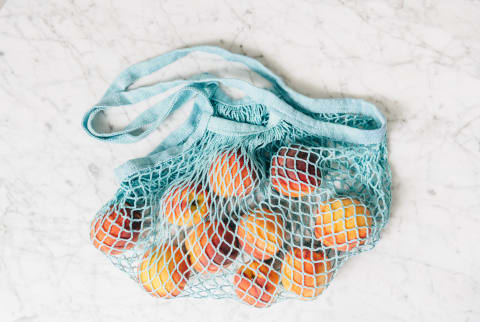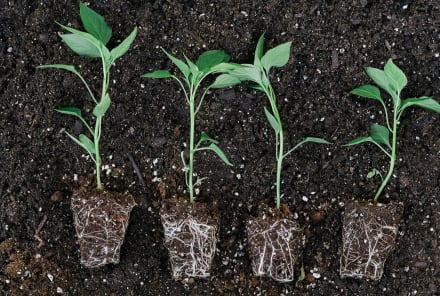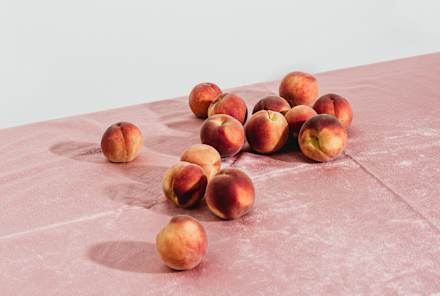Advertisement
8 Ways You Can Recycle (Even If You Live In A Place That Doesn't Make It Easy)


I've spent the better part of my life living in Reduce, Reuse, Recycle–friendly locales, so I figured they were simply the norm. But after moving to the new, unfamiliar state of Utah, I quickly learned that's not the case at all. Now that I'm in a city that lacks recycling infrastructure, I've developed a new appreciation for some of the roadblocks keeping people from a more mindful, eco-friendly lifestyle. Since the move, I've had to get a little bit more creative with how I approach the things I'm consuming, but these eight tips and resources are helping me out:
1. Ask if you actually need this packaging.
Some habits are hard to form at first but worth the effort. Keeping a supply of tote bags in your car for shopping is one of them. Along with those totes, I have a thermos, a tumbler, and a reusable straw collection that often come in handy. Bonus: Many stores and shops incentivize reusable wares with small discounts (hey, it adds up over time).
2. Consider what else you can do with the packaging when it's empty.
Are things like yogurt, cottage cheese, and hummus regulars on your grocery list? These products often come in containers that are well-shaped for all kinds of food storage. Reuse them for all your home-cooking, meal-prepping, leftover-freezing needs. Using them just a few more times extends the value of that original product manifold.
Additionally, paper napkins float around our world in excess. Instead of throwing them out with your catered meal, takeout, or fast food order, bring the clean ones home for later use. Personally, I keep a stash of them in my car's glove box. When I unexpectedly need them, they're always within arm's reach.
3. Remember that SO many items have recycling potential. (When in doubt, Google it!)
Case in point: Derrick Senior, found of RecycleBalls, lives by the motto "Yellow is the new green" and is spearheading an initiative to recycle tennis balls across the nation. Another item that seems like obvious trash? Old shoes. Instead of allowing them to become part of an ever-growing landfill, you can give them to a number of different organizations that accept used sneakers for recycling and reuse, including Nike's Reuse-A-Shoe program, Soles for Soles, and It's From the Sole. Even if your city doesn't have a great setup for plastic and paper collection, it might be close to programs like these, so do a little research before throwing anything away.
4. Ever heard of the 30 Wears Challenge? It applies to more than just clothing.
In the fashion world, the "30 Wears Challenge" means asking "Will I wear this at least 30 times?" before buying anything new. If the answer is no, the idea is that you should opt out of the purchase since you can't justify the resources that went into making it. I've found that this simple exercise works with everything, not just clothing. "Am I buying a beach chair and umbrella for one afternoon at the beach?" If the answer is yes, rent instead! "Do I really need these balloons for an evening at my friend's engagement party?" Probably not, but how about reusable décor in its place?
5. Utilize community resources.
Utilizing your community's resources is a nice way to reduce consumption and keep waste to a minimum. Your local library is a great place to start! Other resources can include a toy library, a tool library, an art library, or other types of swapping/lending outposts. Google whether there are any in your area, and if not, consider starting one with your with friends and family, neighbors, or other community members. It doesn't have to be formal! Gathering a few friends for a clothing swap is an easy way to start.
6. Check out the low-waste apps out there.
Apps continue to expand their reach when it comes to utility and purpose. For example, OLIO is a food-sharing app that connects neighbors so they can give each other untouched food they're not going to use. So far, it's helped almost 1 million people reduce their food waste. Apps like these are impactful because 40% of all food ends up in the trash. Keeping yours out of the landfill will reduce greenhouse gases like methane and help save money in the process.
Another great digital resource is ShareWaste—a similar concept, but it connects neighbors so they can collect and distribute compost. It's perfect for anyone who wants to compost but doesn't have an actual use for the composted material (especially condo and apartment-dwellers). Additionally, it can be great for people with large gardens in need of some more nutrients.
7. Don't forget about e-waste!
"Old devices and e-waste should never be put in a landfill," says Chase Baker, a strategist for HowtoWatch, a company that helps people streamline their electronic use. "They contain hazardous materials like mercury, lead, cadmium, beryllium, chromium, and chemical flame retardants which pose large problems when exposed to soil and water." When technology is past the point of refurbishing, options like Call2Recycle and SellCell help you pass along your old products to the right places. For more tips on how to handle your e-waste responsible, check out this guide.
8. Don't trash your plastic baggies.
It's a little-known fact, but soft plastic bags are recyclable—they're just not accepted by most curbside programs. To make recycling them more convenient, recycling company Novolex began a Bag-2-Bag program and installed over 30,000 plastic bag drop-off sites in grocery stores and retailers nationwide. Now, more than 90% of Americans can access a plastic bag recycling site within 10 miles of their home. See if there's a drop-off point near you here, and get a pile of your produce bags, paper towel wraps, and cereal box liners ready!











